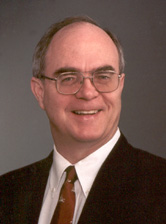 James Armitage, M.D., Joe Shapiro professor of medicine and UNMC oncologist, has joined the new Roche Foundation for Anemia Research (RoFAR), a charitable organization to encourage innovative research in anemia.
James Armitage, M.D., Joe Shapiro professor of medicine and UNMC oncologist, has joined the new Roche Foundation for Anemia Research (RoFAR), a charitable organization to encourage innovative research in anemia.
Dr. Armitage is one of eight members of the foundation’s board of trustees.
Incorporated in Switzerland, the Roche Foundation for Anemia Research is legally independent from Hoffmann-La Roche Inc. (Roche), the U.S. prescription drug unit of the Roche Group, a leading research-based health care enterprise that ranks among the world’s leaders in pharmaceuticals and diagnostics.
The foundation, which is guided by the board of trustees, is being established with an initial commitment from Roche of 16 million Swiss Francs (about $13.5 million) over the first four years. Other board of trustees members are: Nathan Levin, U.S., chairman; Charles Herzog, U.S.; Adeera Levin, Canada; Jean Francois Morere, France; Neil Powe, U.S.; Eberhard Ritz, Germany; and Lars Birgerson, U.S.
“Anemia is one of the most common pathological states,” Dr. Armitage said. “It’s not a disease. It’s a condition. There are many causes of anemia. To better understand anemia is important to help people. Research could ultimately make life better for a lot of people. Cancer patients also are affected by anemia.”
Anemia occurs when erythropoiesis, the production of red blood cells, is disturbed. Diseases of the kidney often result in impaired production of erythropoietin leading to anemia. Anemia in cancer patients may be related to the disease itself or the effect of concomitant chemotherapy. One of the most common symptoms of anemia is fatigue. In some cases, anemia can be life threatening.
William Burns, head of Roche’s Pharmaceutical Division, said Roche currently markets NeoRecormon, the leading anemia therapy in Europe and is developing CERA, the first continuous erythopoiesis receptor activator for global commercialization. “We are committed to improve outcomes for anemia patients. This cannot be addressed by the pharmaceutical industry alone, but needs the collaboration of academia and practicing physicians.”
“RoFAR will stimulate new research in anemia,” said Nathan Levin, M.D., medical & research director, Renal Research Institute, New York, and chairman of the RoFAR board of trustees. “Anemia can be a serious complication for many renal and oncology patients and I hope that physicians and researchers around the world will seize the opportunity that RoFAR offers to become involved in research that will help to improve our understanding of this debilitating condition.”
Established members of academic staff at universities, dialysis centers and research institutes are invited to apply to RoFAR for funding. New research in areas associated with the study of anemia related to kidney disease and oncology; anemia of chronic disease; anemia related to congestive heart failure and stroke and the effects of erythropoetic drugs on endothelium and brain will be considered.
The first round of awards will be announced at the American Society of Hematology Meeting in San Diego on Dec. 3-7, 2004.